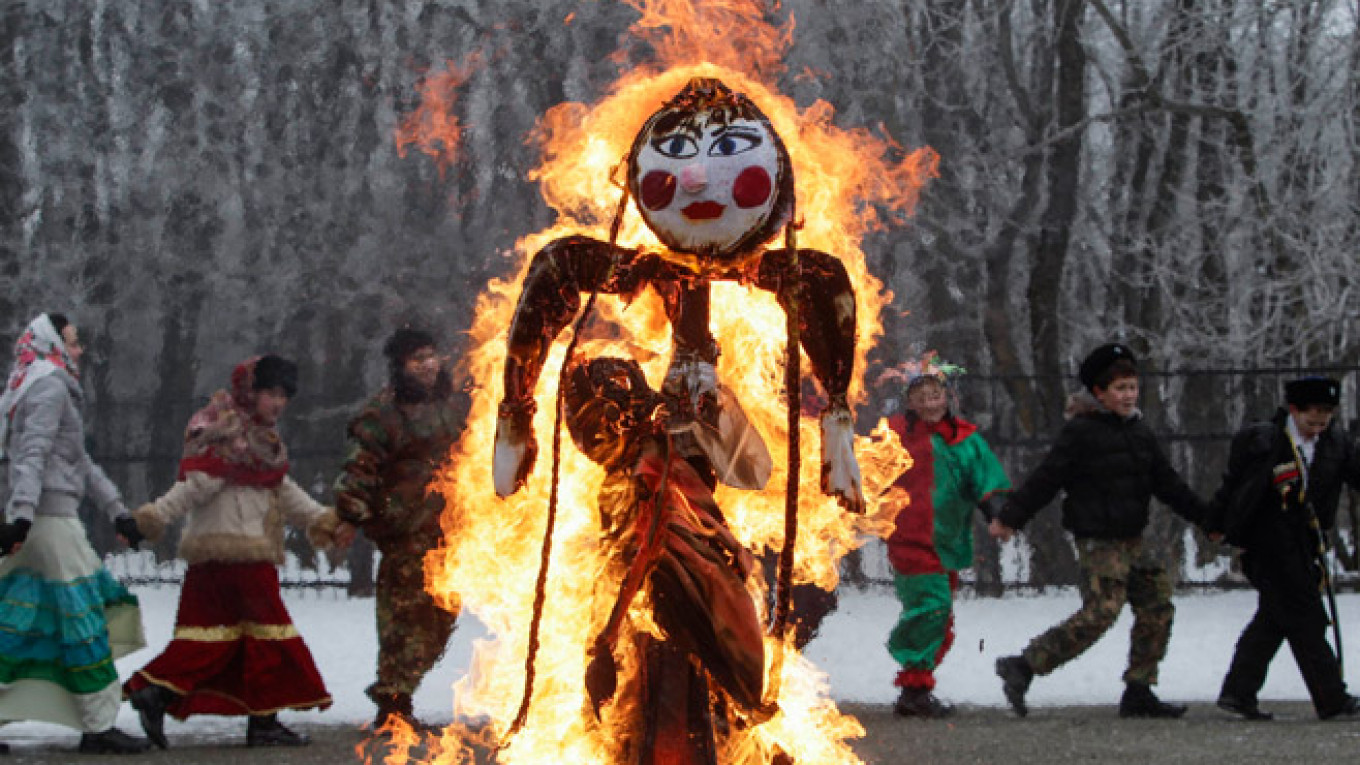???????‚: fast, post
This week begins the seven-week fast — ?’?µ?»???????? ???????‚ (Lent) — that precedes the great celebration of ???°???…?° (Easter). For pious Orthodox Christians, this is a time of abstinence, prayer and good works. But to the contrary, for vegans and vegetarians, it is a time of joyful gluttony. For a few weeks every restaurant and cafe has a ???????‚?????µ ???µ???? (fasting menu), and even the smallest supermarket stocks ?????µ???‹?? ???‹?€ (tofu, literally "soy cheese"), ?????????°?»???????µ ?????»?????? (almond milk) ?? ???????‚???‹?? ???°???????µ?· (non-dairy mayonnaise). Folks with lactose intolerance — rejoice!
???????‚ is one of those interesting words that has been imported into the Russian language three times with three different meanings. The oldest and most obscure borrowing is of ???????‚ as a fast.
Etymologists argue in their polite way about when and where this took place, and when they cite Moravian-Pannonian Slavic tribes, my eyes begin to glaze over. Whenever and however and from whomever it was borrowed, by the 11th century ???????‚ was used in religious texts.
If you want to say you are fasting, you can use the verb ???????‚???‚??????, which usually, but not always refers to a religious fast: ???µ???°?€???? ?¶?µ ?»?????? ???????‚???‚???? ???? ???€?µ???? ???µ?€???‘?·?????? ?‚?????€?‡?µ???????? ?€?°?±???‚?‹ (There's a good reason why people fast during serious creative work). Or you can say ???µ?€?¶?°?‚?? or ?????±?»?????°?‚?? ???????‚ (to hold to or observe the fast).
Of course, fasting is not easy, especially considering it means abstinence from meat, dairy, most alcohol, frivolous entertainment like television, movies, murder mysteries and even sex. ?? ???‚?°?€?°?»????, ???? ?????‘-?‚?°???? ???°?€?????°?» ???????‚ (I tried, but I broke the fast anyway).
If you are talking about fasting, it's good to know the adjectives ???????‚???‹?? (what you can eat or drink on a fast) and ???????€???????‹?? (what you can't eat or drink, from a word that originally referred to animal fat).
In very rarified contexts, ???????€???????‹?? can also have the figurative meaning of something vulgar and distasteful.
? ?µ?±???‚?° ???€?????»?? ?? ???‚?????????°?»?? ?€?°?·???‹?µ ???????€???????‹?µ ?????‚???‡????, ???????° ?????? ???°???° ???… ???µ ???‹?????°?»?°. (The guys came over and made a bunch of vulgar jokes until my mother threw them out.)
The second borrowing of ???????‚ came from the Latin via French and Italian. This ???????‚ refers to the three post p's: place, people and position. That is, ???????‚ can be a place of observation, like ???????‚ ?“???? (auto inspectorate post) or ???????‚ ???µ?????µ???‚?‘?€ (the nurses' station). ???‚?????‚?? ???° ???????‚?? means to be on guard duty. Or ???????‚ can mean the people doing the observing or guarding, like ???‚???€???¶?µ?????? ???????‚ (guards) or ???°?????‚?°?€???‹?? ???????‚ (medics).
Or it can be a position in a company, government or military, usually high up: ?????‚???? ???????????°?», ?‡?‚?? ?»?????? ???· ?µ???? ?±?»???¶???µ???? ???€?????° ???°?»?µ???? ???µ ?????‚?????‹ ?·?°?????‚?? ???»???‡?µ???‹?µ ???????‚?‹ ?? ???????????°?€???‚???µ. (Putin realized that men in his intimate circle were hardly willing to hold key government positions.)
And the third borrowing is from English social networks — ???????‚ as in what you post on your Facebook page. You might be directed to ?»???‡?????µ ???????‚?‹ ???° ???‚?? ?‚?µ???? (the best posts on this topic), or asked to do ?€?µ???????‚ (repost) or ???µ?€?µ???????‚ (repost), sometimes with the verbs ???????‚???‚?? (to post) and ???µ?€?µ???????‚???‚?? (to repost): ???€???????±?° ???°?????????°?»?????? ???µ?€?µ???????‚???‚??! (Please repost as much as possible!)
All of these posts give us simple souls plenty of fun: ?? ???µ?€?µ???????‚???»?°, ?‡?‚?? ???? ???????»?°?????»???? ???° ???????‹?? ???????‚ ???? ???€?µ???? ?’?µ?»?????????? ???????‚?° (I reposted that he agreed to take the new position during Lent).
Michele A. Berdy, a Moscow-based translator and interpreter, is author of "The Russian Word's Worth" (Glas), a collection of her columns.
A Message from The Moscow Times:
Dear readers,
We are facing unprecedented challenges. Russia's Prosecutor General's Office has designated The Moscow Times as an "undesirable" organization, criminalizing our work and putting our staff at risk of prosecution. This follows our earlier unjust labeling as a "foreign agent."
These actions are direct attempts to silence independent journalism in Russia. The authorities claim our work "discredits the decisions of the Russian leadership." We see things differently: we strive to provide accurate, unbiased reporting on Russia.
We, the journalists of The Moscow Times, refuse to be silenced. But to continue our work, we need your help.
Your support, no matter how small, makes a world of difference. If you can, please support us monthly starting from just $2. It's quick to set up, and every contribution makes a significant impact.
By supporting The Moscow Times, you're defending open, independent journalism in the face of repression. Thank you for standing with us.
Remind me later.


